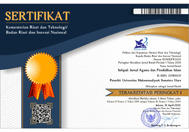The Effect Of Learning Qur'an Education On The Character Of Grade VII Students Of SMP IT Ar Risalah Sukoharjo
Abstract
This study aims to: 1) Understand the implementation of Al-Qur’an education at SMPIT Ar Risalah Laweyan, Sukoharjo, during the 2023/2024 Academic Year; 2) Identify the character of seventh-grade students at SMP IT Ar Risalah Laweyan, Sukoharjo, during the 2023/2024 Academic Year; and 3) Analyze the influence of Al-Qur’an education on the character of seventh-grade students at SMP IT Ar Risalah Laweyan, Sukoharjo. This research employs a quantitative approach with a correlational method. The subjects of the study are seventh-grade students, with additional information sourced from Al-Qur’an teachers and students. Data were collected using questionnaires, interviews, observations, and documentation. Data analysis includes data collection, data reduction, respondent data analysis, and conclusion drawing. The findings reveal that Al-Qur’an education at SMP IT Ar Risalah has been implemented through planning, execution, and evaluation phases to shape students’ character. In the planning phase, the school’s vision and mission serve as guidelines for Al-Qur’an education, supported by a strong commitment to Islamic values-based education. The execution phase systematically integrates the Al-Qur’an education-based curriculum. Meanwhile, the evaluation phase is conducted transparently, accountably, efficiently, and effectively to improve the quality of education. This study concludes that Al-Qur’an education significantly contributes to shaping students' character, creating a conducive learning environment aligned with Islamic educational values.
Keywords
Full Text:
PDFReferences
Asmani, J. M. (2011). Buku Panduan Internalisasi Pendidikan Karakter di Sekolah. Yogyakarta: Diva Press.
Barnawi, & Arifin, M. (2012). Strategi & Kebijakan Pembelajaran Pendidikan Karakter. Yogyakarta: AR-Ruzz Media.
Bungin, B. (2004). Metodologi Penelitian Kuantitatif. Jakarta: Kencana.
Departemen Agama RI. (1989). Al-Qur’an dan Terjemahannya. Jakarta: Depag RI.
Irawan, P. (2016). Penelitian Kuantitatif dan Kualitatif untuk Ilmu-Ilmu Sosial. Depok: Departemen Ilmu Administrasi FISIP UI.
Lickona, T. (2012). Mendidik untuk Membentuk Karakter: Bagaimana Sekolah Dapat Memberikan Pendidikan Sikap Hormat dan Bertanggung Jawab (J. Abdu Wamaungo, Penerj.). Jakarta: Bumi Aksara.
Nata, A. (2010). Ilmu Pendidikan Islam. Jakarta: Kencana.
Saebani, B. A., & Akhdiyat, H. (2012). Ilmu Pendidikan Islam. Bandung: CV Pustaka Setia.
Slameto. (2003). Belajar dan Faktor-Faktor yang Mempengaruhinya. Jakarta: Rineka Cipta.
Syah, M. (2006). Psikologi Belajar. Jakarta: Rajawali Press.
DOI: https://doi.org/10.30596/21556
Refbacks
- There are currently no refbacks.
Intiqad Jurnal Agama dan Pendidikan Islam is abstracting & indexing in the following databases:
View My StatsEditorial Address:
Faculty of Islamic Religion, Universitas Muhammadiyah Sumatera Utara. Jl. Mukhtar Basri No. 3 Medan 20238 Telp. (061) 6622400 ext. 27 dan 28 Fax. (061) 6625474. e-mail: intiqad@umsu.ac.id

_(1).png)























